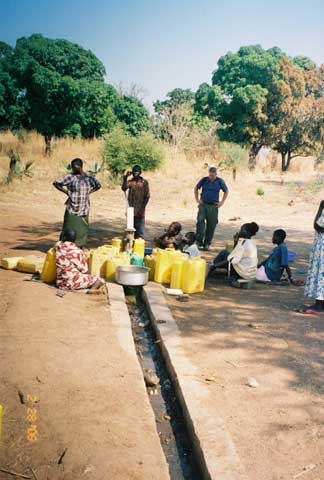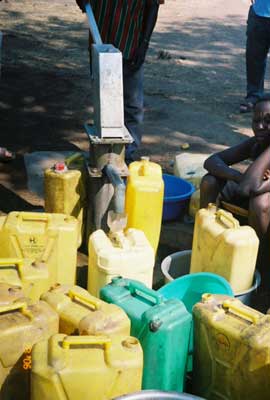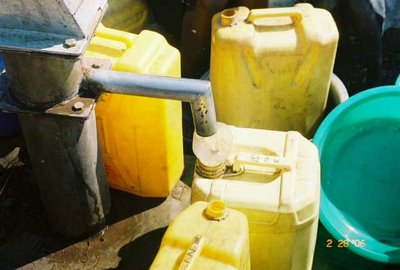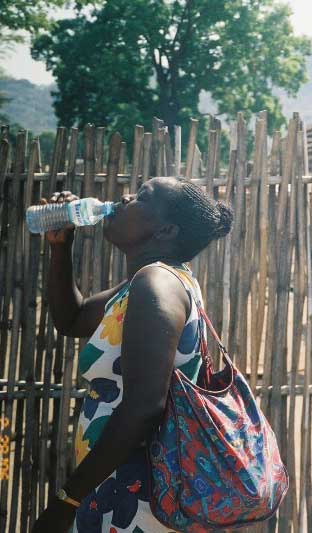 Waiting for Water
Waiting for WaterIf I understand it correctly, there were two boreholes within "reasonable" walking distance of Lui. This was the one we passed on our Ash Wednesday walk.
People were gathered all around it. And I noticed lots of water containers placed all about. Later I learned that it’s because of the drought. Women would come to the well, hoping to find water, but there was none. So they would just leave their container and go on about other business, coming back later in hopes of water.
What’s the deal with the water? It took me a long time to understand it, and I’m not really sure I do even now, but at least I understand more than I did before.
 Yes, there are a few wells in Lui. Not many, mind you. They are spread about 5 miles apart. Try to imagine that, my U.S. friends. Try to imagine having to walk 5 miles to get enough water for your family to get through a day … or two … or three.
Yes, there are a few wells in Lui. Not many, mind you. They are spread about 5 miles apart. Try to imagine that, my U.S. friends. Try to imagine having to walk 5 miles to get enough water for your family to get through a day … or two … or three.Then add this: The drought in Lui is so severe that even the wells are running dry. You walk half the morning to get to a well. But the well isn’t producing any water. You have to wait until the water can slowly trickle through the granite substrate and come trickling into the bottom of the well again.
Meanwhile, many other peoples’ water containers sit gathered around the well … waiting and hoping …
Finally, the water starts flowing again.
 Maybe you’ll be one of the lucky ones who gets her water container filled. Maybe your water will be clean. Maybe – just maybe! – you’ll get water that is not contaminated with cholera or any of the other many water-borne diseases in Lui.
Maybe you’ll be one of the lucky ones who gets her water container filled. Maybe your water will be clean. Maybe – just maybe! – you’ll get water that is not contaminated with cholera or any of the other many water-borne diseases in Lui.I cannot tell you how many women I met who were spending their entire day trying to collect water for their family. It was breathtaking to me. The lucky few women who have (supposedly) “paying” jobs at Samaritan’s Purse hospital, who would spent their entire day off walking back and forth to one of the wells, hoping to collect enough water to take care of their family during the next week.
And I saw this a lot, too: We would be coming home in our truck at night – maybe 8:00 p.m. or later. And I would see women walking along the track toward the well. Why? Because it’s cooler in the night, when you have nothing but the meager moon to light your path. But at least you do not have to walk in the 110-degree heat that greets every day in Lui!
I was overwhelmed by the struggle it takes merely to survive in Lui. Remember Maslow’s pyramid of the basics of human existence? Water. Food. Shelter. Merely getting water could kill me in Lui. It’s that difficult.
And here’s another complication. When our Bishop first explained the water situation to my parish, before I made the trip to Lui, he stressed the need for water and wells and boreholes. We all wanted to do something to dig deeper wells. But then he had to explain to us the Lui hesitance to dig deeper wells: They are afraid to dig deeper wells, because the oil is so near the earth that they might accidentally strike oil. And our western minds said, “Yee-haw! ‘Black gold!’ ‘Texas tea!’” But no. One of the significant reasons that the northern Khartoum government waged war against the South for 2 decades was because southern Sudan has so many natural resources, and the Khartoum government apparently covets those resources. So if you try to drill a deep well in Lui to provide water for a village – but accidentally hit an oil well – there’s a risk that the Khartoum government will learn about it, and come in and destroy your village and your family and neighbors. So – weird as it seems to me – digging a deeper well is actually a risk and one that you probably do not want to endure.
So the people die of thirst, because digging deep wells might bring renewed warfare due to the lust for oil. How sick is that??!!??
And what will it take to quench this people’s thirst?





No comments:
Post a Comment